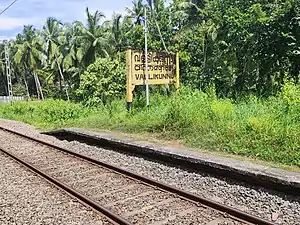Vallikkunnu
Vallikkunnu is a village in Tirurangadi Taluk of Malappuram district in the state of Kerala, India with an area of 25 km2. It is located 5 km north of Parappanangadi town and comes under the jurisdiction of Parappanangadi Police Station and Parappanangadi Judicial First Class Magistrate Court. Its latitude and longitude are 11'07" N and 7'51"E respectively. Vallikkunnu was awarded the best panchayath of Kerala in 1997.[1][2] Vallikunnu is situated on Tirur-Kadalundi Road.[3] Vallikkunnu is also a part of the Oldest Railway Line of Kerala laid in 1861 from Tirur to Chaliyam via Tanur, Parappanangadi, Vallikkunnu, and Kadalundi.[3]
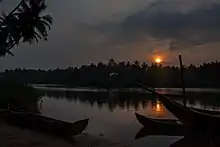
Vallikkunnu | |
|---|---|
village | |
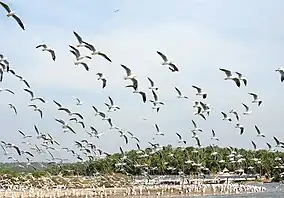 Kadalundi Bird Sanctuary is located in the Balathiruthi Island clusters of Vallikkunnu | |
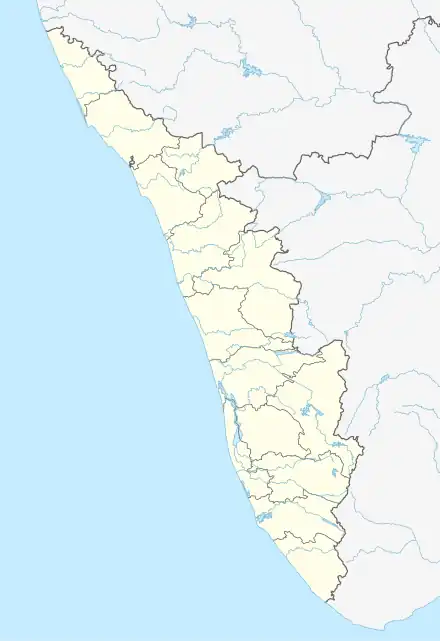 Vallikkunnu Location in Kerala, India  Vallikkunnu Vallikkunnu (India) | |
| Coordinates: 11°8′0″N 75°50′0″E | |
| Country | India |
| State | Kerala |
| District | Malappuram |
| Elevation | 2 m (7 ft) |
| Population (2001) | |
| • Total | 22,853 |
| Languages | |
| • Official | Malayalam, English |
| Time zone | UTC+5:30 (IST) |
| PIN | 673314 |
| Telephone code | 0494 |
| Vehicle registration | KL-55 KL]]65 |
| Nearest city | Kozhikode |
| Lok Sabha constituency | Malappuram |
| Vidhan Sabha constituency | Vallikkunnu |
| Climate | Moderate (Köppen) |
Vallikkunnu lies on the bank of Kadalundi River. Kadalundi River joins with Arabian Sea at the estuary (Azhimukham) in Kadalundi Nagaram beach of Vallikkunnu Grama Panchayat. Kadalundi Bird Sanctuary and Kadalundi-Vallikkunnu Community Reserve are located here.[4]
Demographics
As of 2001 India census, Vallikkunnu had a population of 22853 with 11057 males and 11796 females.[1] It comes under Thirurangadi thaluk. The northern boundary is Kadalundi river and southern side with Parappanangadi Municipality. The village has a coastline of 8 kilometers with arabian sea in the west. The east is covered with Chelembra, Tenhipalam and Moonniyoor Panchayaths.[5][6]
History
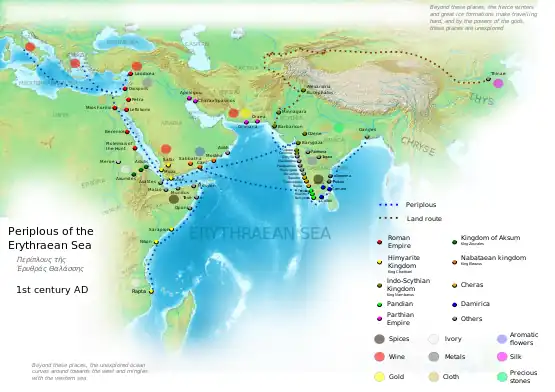
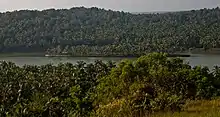
Vallikkunnu-Kadalundi-Chaliyam-Beypore had trade relations with foreign countries like Rome and Arabia since the era of king Solomon. Tyndis, which was a major center of trade, next only to Muziris, between the Cheras and the Roman Empire, is identified with Kadalundi.[7] Pliny the Elder (1st century CE) states that the port of Tyndis was located at the northwestern border of Keprobotos (Chera dynasty).[8] The North Malabar region, which lies north of the port at Tyndis, was ruled by the kingdom of Ezhimala during Sangam period.[9] According to the Periplus of the Erythraean Sea, a region known as Limyrike began at Naura and Tyndis. However the Ptolemy mentions only Tyndis as the Limyrike's starting point. The region probably ended at Kanyakumari; it thus roughly corresponds to the present-day Malabar Coast. The value of Rome's annual trade with the region was estimated at around 50,000,000 sesterces.[10] Pliny the Elder mentioned that Limyrike was prone by pirates.[11] The Cosmas Indicopleustes mentioned that the Limyrike was a source of peppers.[12][13]
According to the Legend of Cheraman Perumals, the first Indian mosque was built in 624 AD at Kodungallur with the mandate of the last the ruler (the Cheraman Perumal) of Chera dynasty, who converted to Islam during the lifetime of Prophet Muhammad (c. 570–632).[14][15][16][17] According to Qissat Shakarwati Farmad, the Masjids at Kodungallur, Kollam, Madayi, Barkur, Mangalore, Kasaragod, Kannur, Dharmadam, Panthalayini, and Chaliyam (just opposite to Vallikkunnu), were built during the era of Malik Dinar, and they are among the oldest Masjids in the Indian subcontinent.[18] It is believed that Malik Dinar died at Thalangara in Kasaragod town.[19]
After the breakdown of the Chera Kingdom dynasty rooted in Kadalundi, Parappanad Kovilakam of Parappanangadi became the rulers of Vallikkunnu. Parappanad royal family is a cousin dynasty of the Travancore royal family.[20][21] They gave permission for the Dutch to build a fort at Kadalundi. Even though the fort collapsed after a war with Zamorins, we can see the remnants in Mulla. Later the British became the rulers of Vallikkunnu and they built railway lines from Tirur up to Chaliyam for the purpose of business. Later it was extended to Shoranur. Marthanda Varma, the founder of Travancore, belongs to Parappanad royal family.[20]
Thundi is an ancient seaport and harbor-town north of Muziris (Muchiri) in the Chera Kingdom (Keprobotos), modern day India on the Malabar Coast.[22][23] The exact location of the port is still unknown, modernday Kadalundi Nagaram, Ponnani, Tanur, and Pantalayani Kollam[24] are often identified as Tyndis located in the Sangam age Tamil kingdom of the Cheras. Tyndis was a major center of trade, next only to Muziris, between the Cheras and the Roman Empire in the early centuries of the Christian era. A branch of the Chera royal family is also said to have established itself at Tyndis. It is also speculated that Tyndis (along with ports such as Naura, Bakare and Nelkynda) operated as a satellite feeding port to Muziris.[7]
Wards of Vallikkunnu
Vallikkunnu Grama Panchayat is composed of the following 23 wards:[25]
| Ward no. | Name | Ward no. | Name |
|---|---|---|---|
| 1 | Kadalundi Nagaram North | 2 | Keezhayil |
| 3 | Navajeevan | 4 | Balathiruthi |
| 5 | Anayarangadi | 6 | Madathil Purayi |
| 7 | Kizhakkemala | 8 | Olipram |
| 9 | Paruthikkad | 10 | Pottenkuzhi |
| 11 | Kacherikunnu | 12 | Karumarakkad |
| 13 | Kodakkad East | 14 | Kodakkad South |
| 15 | Kodakkad West | 16 | Ariyallur East |
| 17 | Madhavanandam | 18 | Ariyallur South |
| 19 | Ariyallur Beach | 20 | Ariyallur North |
| 21 | Anangadi South | 22 | Anangadi |
| 23 | Kadalundi Nagaram |
See also
External links
References
- Registrar General & Census Commissioner, India. "Census of India : Villages with population 5000 & above". Retrieved 10 December 2008.
- "വള്ളിക്കുന്ന് ഗ്രാമപഞ്ചായത്ത്". Mathrubhumi.
- "ആ ചൂളംവിളി പിന്നെയും പിന്നെയും..." Mathrubhumi. 17 June 2019. Retrieved 19 December 2020.
- "Kadalundi-Vallikkunnu community reserve". www.onmanorama.com. 4 April 2018. Retrieved 25 July 2020.
- "CEO Kerala :: Malappuram". www.ceo.kerala.gov.in.
- "Charamparambu (ii), Vallikkunnu Panchayat, Malappuram District, Kerala, India". Kerala Tourism.
- Coastal Histories: Society and Ecology in Pre-modern India, Yogesh Sharma, Primus Books 2010
- Gurukkal, R., & Whittaker, D. (2001). In search of Muziris. Journal of Roman Archaeology, 14, 334-350.
- A. Shreedhara Menon, A Survey of Kerala History
- According to Pliny the Elder, goods from India were sold in the Empire at 100 times their original purchase price. See
- Bostock, John (1855). "26 (Voyages to India)". Pliny the Elder, The Natural History. London: Taylor and Francis.
- Indicopleustes, Cosmas (1897). Christian Topography. 11. United Kingdom: The Tertullian Project. pp. 358–373.
- Das, Santosh Kumar (2006). The Economic History of Ancient India. Genesis Publishing Pvt Ltd. p. 301.
- Jonathan Goldstein (1999). The Jews of China. M. E. Sharpe. p. 123. ISBN 9780765601049.
- Edward Simpson; Kai Kresse (2008). Struggling with History: Islam and Cosmopolitanism in the Western Indian Ocean. Columbia University Press. p. 333. ISBN 978-0-231-70024-5. Retrieved 24 July 2012.
- Uri M. Kupferschmidt (1987). The Supreme Muslim Council: Islam Under the British Mandate for Palestine. Brill. pp. 458–459. ISBN 978-90-04-07929-8. Retrieved 25 July 2012.
- Husain Raṇṭattāṇi (2007). Mappila Muslims: A Study on Society and Anti Colonial Struggles. Other Books. pp. 179–. ISBN 978-81-903887-8-8. Retrieved 25 July 2012.
- Prange, Sebastian R. Monsoon Islam: Trade and Faith on the Medieval Malabar Coast. Cambridge University Press, 2018. 98.
- Pg 58, Cultural heritage of Kerala: an introduction, A. Sreedhara Menon, East-West Publications, 1978
- Mheshwari, S Uma. Thrippadidaanam. Mathrubhumi Books. pp. 41–53. ISBN 978-81-8265-947-6.
- (See page 4 in Madras Presidency Records, 1915, Supt , Government Press, Madras.)
- The official web portal of Government of Kerala. "History". Kerala.gov.in. Archived from the original on 9 October 2012. Retrieved 21 September 2012.
- The official web portal of Government of Kerala. "Official Web Portal of Government of Kerala". Kerala.gov.in. Archived from the original on 18 January 2006. Retrieved 21 September 2012.
- History Archived 2012-10-09 at the Wayback Machine.
- "Wards of Vallikkunnu". sec.kerala.gov.in.
